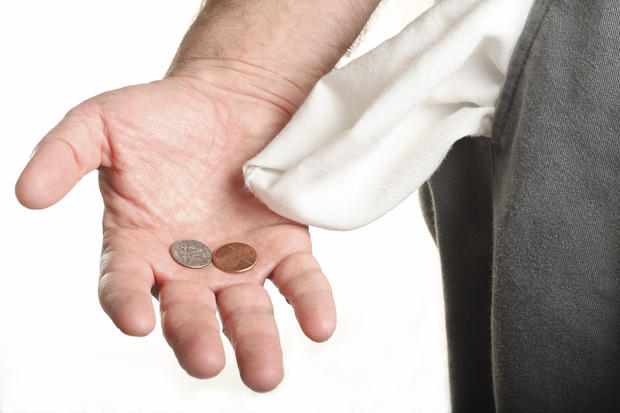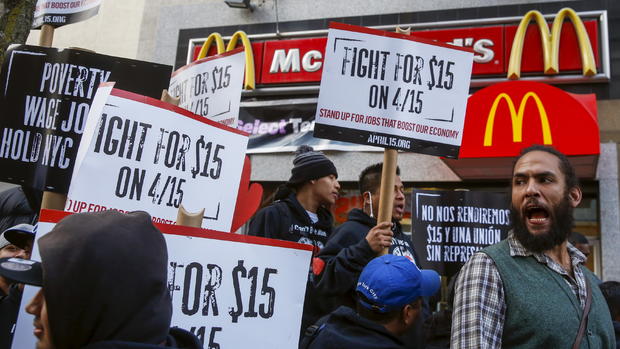Are small businesses ready for a $19 minimum wage?
Polly Armstrong likes to say that she runs the only left-wing Chamber of Commerce in America.
Armstrong is the chief executive of the chamber in Berkeley, California, a city that's been voted as the most liberal city in an already liberal-leaning state. But it's partly because so many residents support the kind of values that are held dear by progressives -- a "living wage" and worker rights, among them -- that the city is currently roiled by a proposal to boost the city's minimum wage to $19 an hour by 2020.
"Because we care about our workers, it feels good to say everyone should get a living wage," Armstrong said. But with the $19 per hour proposal, she said, "What I hear is business owners who say, 'This may put me out of business, but I don't want to say publicly that I don't want to pay my workers everything they deserve.'"
Some business owners don't even earn that high of a wage themselves, Armstrong added. "It's just that bottom line."
In contrast to the federal minimum wage, which has remained at $7.25 an hour since 2009, a number of states and municipalities across the U.S. have been raising their baseline hourly pay. Berkeley's minimum wage of $10 an hour is set to rise to $11 on October 1.
But the reality of living on a minimum-wage income has become a financial hardship for many, given that the federal base wage peaked in 1968 in inflation-adjusted terms.
Yet as more towns and states consider changing their laws to enact higher wages for low-income workers, some residents are asking how high is high enough.
Even in progressive Berkeley, the $19 proposal is proving controversial. Avowedly liberal business owners express concern about their livelihood, while also aspiring to provide their workers with a living wage.
The proposal, which was developed by Berkeley's labor commission, would increase the city's minimum wage to $13 an hour in 2016, after which it would rise incrementally to $19 an hour in 2020. That hourly rate would place Berkeley at the forefront when it comes to minimum wage hikes, putting it far ahead of the $15 per hour wage that's now the centerpiece of a labor activist movement, the Fight for $15.
Advocates for a higher minimum wage in Berkeley point to the difficulties of living on low pay in the city, which lies to the east of San Francisco and is grappling with the socioeconomic changes affecting the region. An influx of wealthy tech workers is widening the income gap and pushing rents and real estate prices sky-high, with the typical one-bedroom apartment renting for more than $2,800 per month, according to RentJungle. That's a jump of about 75 percent in the past six years.
"My mission is how can I fight and win a small measure of justice for the struggling families in Berkeley who are trying to make do on a minimum wage and working three or four jobs and trying to feed their kids," said Kriss Worthington, a progressive member of the Berkeley city council. "The cost of living has gone through the roof."
In a way, the debate is about much more than a person's hourly wage. Berkeley residents are grappling with changes that some fear threaten to transform the city from a one-time hippy haven into a modern outpost of luxury-priced apartments and upscale chain stores.
But raising the minimum wage to $19 an hour may only hasten those changes, according to Armstrong. "It's one thing if you want a town full of Applebys and P.F. Changs, but that's not what Berkeley wants," she said.
The city already has a series of minimum wage increases slated through 2016, and some business owners said they would like to see how those impact their operations before making additional hikes, according to the news site Berkeleyside.
While business owners who spoke with CBS said they support giving their workers higher wages, they also said boosting wages to $19 an hour would threaten the viability of their stores. They spoke on condition of anonymity for fear of appearing to place business interests ahead of workers.
Modest minimum wage increases haven't had a negative impact on businesses, according to one widely cited study published more than two decades ago that looked at the impact on fast-food restaurants in New Jersey and Pennsylvania when New Jersey boosted its baseline pay in the early 1990s. Economist David Card of the University of California, Berkeley, and Alan Krueger, an economist at Princeton University, found that stores that offered a higher minimum wage had the same employment growth as those that didn't.
But what happens in a city when the baseline wage suddenly surges more than 160 percent higher than the federal minimum hourly rate? It's unclear, although Armstrong predicts the city's small businesses "would be closing doors all over town."
Berkeley's city council has worked to support local small businesses, said city council member Worthington, who adds that the biggest reason that owners close down is due to rent increases, not labor costs. Boosting the minimum wage "is something that brings out intense opinions all over the place," he said. He added, "The whole issue, all across the country, of how to treat workers fairly and how to have successful economic development and successful business -- finding the balance between all of that takes a lot of work."
In the meantime, constituents in Berkeley have time to make their voices heard, given that the proposal to boost the minimum wage to $19 an hour isn't slated to come before the city council until November. Whatever the outcome, the debate is sure to be heated.
Worthington said, "In the Bay Area, there is a broad public support for low-income workers and wanting to see some element of justice for them."

